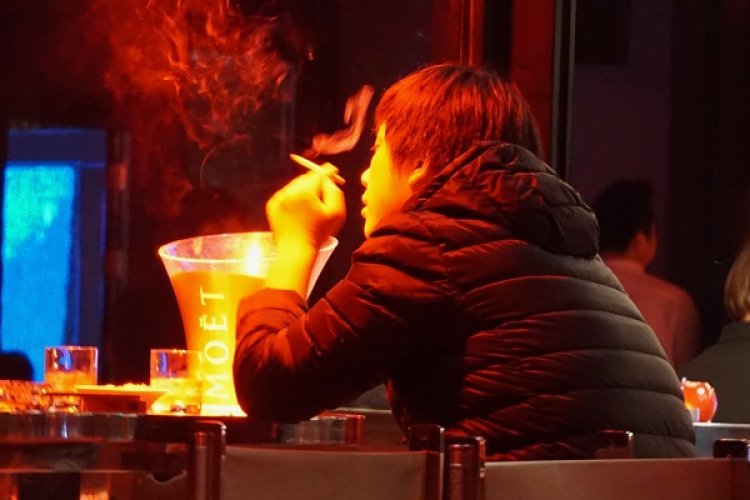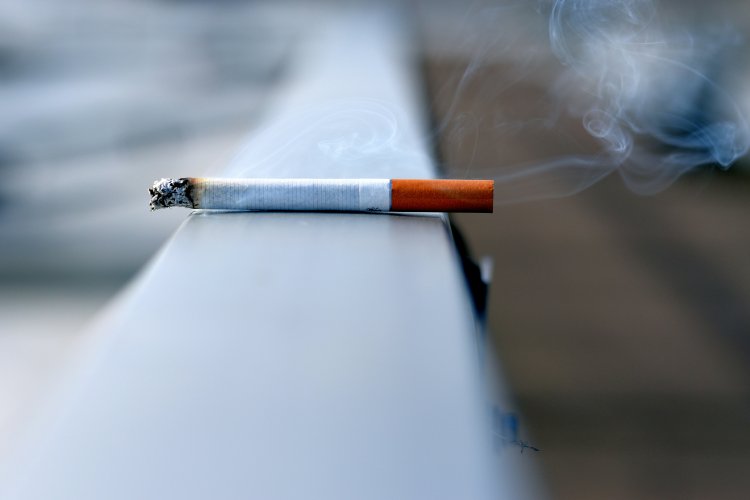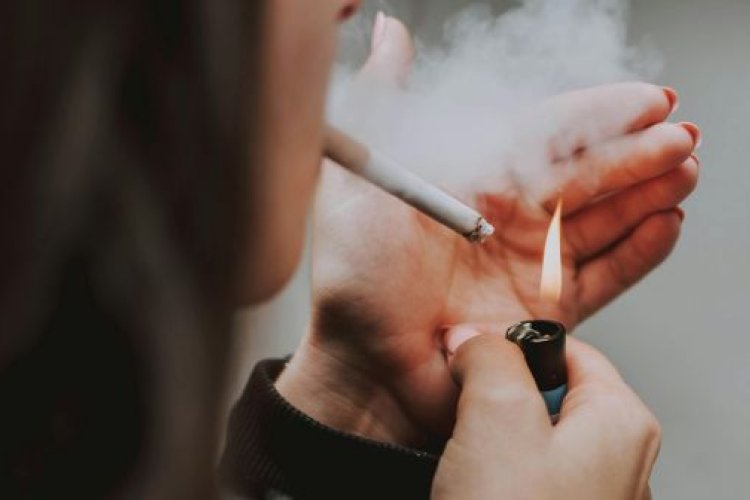Bye Bye Baccy: Bars, Restaurants Prep for Beijing's June 1 Total Indoor Smoking Ban
Indoor life gets a little more difficult for Beijing's estimated 4.2 million smokers in fewer than 10 days as the city enacts the nation's toughest ban on indoor toking June 1.
For the remaining non-smoking millions, that likely means more enjoyable meals and visits to nightclubs that won't result in getting a contact nicotine buzz from the secondhand smoke.
On the eve of the long-planned ban, a survey by the Beijing Municipal Commission of Health and Family Planning revealed that 4.2 million people over the age of 15 smoke in Beijing, or almost a quarter of all adults.
These smokers huff on an average of 14.6 cigarettes daily. That means nicotine fiends are consuming over 61 million cigabutts every 24 hours. That's 5,200 kilometers of cigarettes, enough to form a continuous line from Beijing to Lhasa and back, if laid end to end.
The frontlines in the war on smoking will be in Beijing's bars, nightclubs and restaurants. The commission's survey indicated these are the top spots where people report being exposed to secondhand smoke. A full 90 percent of all respondents say they've encountered smoking in bars, while 66 percent say they've been exposed to it in restaurants.
A quick survey of a few of Beijing's food and beverage hotspots reveals that some are looking forward to the ban, while others are concerned about its impact on business and the issue of selective enforcement.
"I'm actually happy with the ban because it will make it easier for me to make the change to non-smoking," said Kenn Bermel, proprietor of The Local, which currently allows indoor smoking. "I think most smokers will be cool about it."
Jeff Powell, who runs Frost in Xingfucun, allows smoking in his venue after 8pm, but will move to a complete ban after June 1. "I'm not willing to take the hit of a RMB 10,000 fine if someone gets caught," he said.
Greg Savarese, who runs Ricci Cafes in Beijing, Shanghai, and Guangzhou, has never allowed smoking in his cafés and has good news for those in the F&B business fretting about how a ban might affect the bottom line: enforcing a no-smoking environment has never been a problem for Ricci's business.
"If anything, [being a non-smoking venue] makes it a more comfortable environment," he said. "It makes the non-smokers stay longer for an extra cup of coffee or an extra piece of cake."
While he has one or two customers a month who might light up a cigarette, his staff is trained to immediately approach the table and politely ask them to put it out. And smokers almost always understand.
"I've never had a customer choose to leave because they couldn't smoke," he added.
Comparitively speaking, Savarese says, Beijing's already better off than Guangzhou in terms of smoking restrictions.
"Guangzhou is certainly far worse [in terms of smoking]," he said. "The rules are not as strict, nor as enforced, as they are in Beijing."
Carl Setzer of Great Leap Brewing agrees with Savarese: the no-smoking policy Great Leap has adhered to since its initial opening hasn't hurt business at all -- in fact, it has helped.
"People appreciate the diligence with which we train our staff in enforcing the policy," he said. "I'd account a lot of our success to the fact that we've always held to that principle."
The bands that ply Beijing's bars and clubs circuit are also expected to benefit from the ban.
"I'm really excited about this," said Ian Burns, who sings lead for his band the Beijing Beatles. "We play up to two hours of Beatles' stuff at any of our gigs, and to do that in a smoke-filled room is not easy."
Chris Hawke of the Hutong Yellow Weasels put it another way: "I noticed some of the bigger bands refuse to play gigs unless smoking is banned that night," he said. "One of the main reasons I'd like to become more famous is so the Hutong Yellow Weasels can do the same."
Chandler Jurinka, who runs the Slow Boat Brewery Taproom, hasn't allowed smoking since it opened two and a half years ago, and says the policy has been a blessing for both customers and staff.
"Our Taproom is fairly small so [permitting smoking] was never up for consideration," he said. "Smokers don't really mind, and from the beginning we had folks bringing their kids. Our non-smoking staff are also very appreciative they aren't forced to breathe other people's smoke during their shifts."
Tube Station Pizza will be eliminating their designated smoking areas in all branches of their restaurants come June 1.
"We won't be putting ashtrays on the tables and will replace our Designated Smoking Area signs with No Smoking signs," said Marketing Manager Victoria Yang. "If customers insist on smoking, we will politely ask them to go outside."
While most welcomed the new restrictions, some remain concerned about selective enforcement of the ban.
Joshua Lally, who runs Sugar Shack and Lush in Wudaokou, permits smoking only in the evenings at his student-centric bars.
"I'd love to go full non-smoking, but it would put us at a competitive disadvantage if we were the only ones that complied," he said. "If [the authorities] are serious, we will follow, but if there's little enforcement, our customers will just go elsewhere to hang out where they can smoke."
In addition to a complete indoor ban, some outdoor areas will be non-smoking after June 1 as well, such as:
– Youth activities facilities such as playgrounds;
– Sporting fields;
– Areas with cultural relics such as the Forbidden City;
– Designated waiting areas like lines for buses;
– Temporary large-scale outdoor activity areas;
– Outside maternity clinics and childrens' hospitals.
While Beijing has attempted (and failed) to institute smoking restrictions in the past, this time the city seems a few degrees more serious. Venues face fines of up to RMB 10,000 allowing smoking, while smokers themselves will be subject to fines of up to RMB 200.
Beijing residents also have become more sensitive to the issue of air quality in recent years due to public uproar over hideously awful outdoor air quality measurements which are now regularly reported by the city government.
The city's official anti-smoking campaign has leveraged this newfound sensitivity to air quality by pointing out that indoor smoking is far worse in terms of PM 2.5 than even the most hideous bad air day in the city.
While the city has pledged enforcement and regular checks, they are also encouraging social media users to join in a grass-roots attempt to help them stamp out indoor smoking. You can do your part if you are a user of WeChat, by adding the "No Smoking Beijing" WeChat account and reporting violations of the policy.
To add the account, use WeChat to search either "无烟北京" or the pinyin "wuyanbeijing".
Once you've followed the account, you can report smoking violations by going to the third option on the menu bar at the bottom "控烟行动" (marked as 1 below) then choose "我要举报" (marked as 2) from the pop-up menu:

Once you've done that, you can type a message in the field, upload pictures and add the address where you spotted the violation.

Image: No Smoking Beijing
Related stories :
Comments
New comments are displayed first.Comments
![]() admin
Submitted by Guest on Fri, 05/22/2015 - 13:24 Permalink
admin
Submitted by Guest on Fri, 05/22/2015 - 13:24 Permalink
Re: Bye Bye Baccy: Bars, Restaurants Prep for Beijing's June...
Oh, 4G on China Mobile!
Is it expensive? Is it worth trying?
It kinda sux
I haven't tried anything else, but it seems slow to me.
Validate your mobile phone number to post comments.




